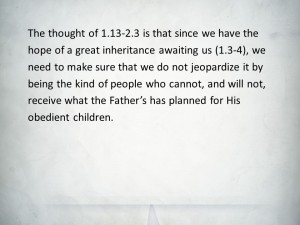 “Therefore” is the first word in 1 Peter 1.13. It makes an immediate connection with the preceding discussion. The thought of 1.13-2.3 is that since we have the hope of a great inheritance awaiting us (1.3-4), we need to make sure that we do not jeopardize it by being the kind of people who cannot, and will not, receive what the Father’s has planned for His obedient children. That means, in a word, that we must make sure that we truly are the children of our heavenly Father.
“Therefore” is the first word in 1 Peter 1.13. It makes an immediate connection with the preceding discussion. The thought of 1.13-2.3 is that since we have the hope of a great inheritance awaiting us (1.3-4), we need to make sure that we do not jeopardize it by being the kind of people who cannot, and will not, receive what the Father’s has planned for His obedient children. That means, in a word, that we must make sure that we truly are the children of our heavenly Father.
The word “children” appears in 1.14, followed by the fact that we address God as our Father in 1.17. This is further picked up in 2.1-3, where Peter uses the imagery of babies who long for milk. The overall picture is that of children who are nurtured by their Father, and part of that nurturing is taking on our Father’s image, His character, His traits. The fact is that children are like their parents, and it is “natural” for it to be this way. So in the family of God, our Father raises us up to share in His qualities. The imagery of a family also surfaces in 1.22 with the exhortation to practice the love that naturally is found among siblings of the same family. It is in this context of family imagery that Peter delivers some important exhortations. The theme of 1.13-2.3, then, is how to be God’s children so as to make sure that we will receive our inheritance.
The “flow” of 1.13 – 2.3 is as follows: first, being the kind of people who are truly the children of our Father is a matter of the will, it is a decision we must make. For this reason Peter exhorts us in 1.13 to prepare our minds for action and to remember the goal before us. Being children of God in a world full of sin, fleshly lusts, and death is not easy, and it certainly is not “automatic.” It requires that we decide, determine, and concentrate on it.
Then, since we have been born again into a new family (1.3) we must change our behavior so that we are no longer living like rebels against our Father, but instead are living like obedient children who are taking on the qualities of our Father, especially the quality of holiness (1.14-16). The days of living by our fleshly lusts are to be over (cf. 4.1ff). Now our aim is to share in our Father’s own holiness, just as God said in Lev 11.44f (and a few other places as well, quoted in 1 Peter 1.16).
As we go about living under the guidance of our Father, we must also maintain a healthy respect for Him (1.17). Our closeness to Him in no way means that we may sin against Him with impunity. He will judge us impartially, that is, without favoritism, because He will not compromise His own holiness. Furthermore, we must remember that our place in the family of God was obtained at the greatest cost imaginable. He bought us out of the slavery of sin and death not with some amount of gold or silver, but with the blood of His own Son, the unblemished Lamb of God (1.18-19). It was expensive for God to redeem us and bring us into His family. We simply cannot think of it as “no big deal.” We must understand that because God redeemed us at such great cost, we owe our lives to Him. To put that personally, I now have the life I have because God was willing to pay its cost. Since he paid for my life, my life now belongs to Him.
Yet the situation is even greater than this. God’s plan of salvation is sometimes depicted as a response to our sin, and there is an element of truth to that. However, God’s response to the problem of sin was not chronologically a decision made after we had sinned. It was made before we sinned, because God knew we would sin and that we would need to be rescued. In other words, God did not wait until man had actually sinned to formulate His plan of rescue. Before the foundation of the world God knew that we would be in trouble, and so back then, before He said “Let there be light” He already had the plan for our escape, and it already included the death of Jesus (1.20; see also Acts 2.23). The fact that Jesus did not appear in the world until the early years of the first century (or so) might mislead some people to think that the plan of salvation was a kind of afterthought on God’s part, a reaction to a late problem. But it was not. Even though Jesus came to this earthly only (relatively) “recently,” the fact is that God had always – from the very beginning – planned to sacrifice Jesus for our sins.
 The significance of this is that God has always wanted us to be His children. He has desired us to be part of His family from the very beginning, since ages and ages before we were even born. And His plan was that we would come into His family through Jesus, who brings us to God (1.21). The basis of this relationship is faith in God, who has demonstrated His intention toward us by raising Jesus from the dead. What God has done for Jesus is what God plans to do for us as well, and thus the resurrection of Jesus proves His kind desire for us and gives us the incentive to be people of faith.
The significance of this is that God has always wanted us to be His children. He has desired us to be part of His family from the very beginning, since ages and ages before we were even born. And His plan was that we would come into His family through Jesus, who brings us to God (1.21). The basis of this relationship is faith in God, who has demonstrated His intention toward us by raising Jesus from the dead. What God has done for Jesus is what God plans to do for us as well, and thus the resurrection of Jesus proves His kind desire for us and gives us the incentive to be people of faith.
We are, therefore, now members of God’s family. That also means that we are to love the other members of the family (1.22). This love is not to be lip-service nor token service. It must be a true, active, and enduring kind of love because it has been taught to us by God’s own word, the gospel, which is living and enduring itself, just as Isaiah 40 describes it (quoted in 1.24-25).
The living and enduring gospel teaches us a living and enduring love, and it teaches us the holiness of our Father which is to characterize us as well. The more we take in this word, the more we will grow in love and holiness, which in turn will result in the salvation of our souls from sin’s consequences. Therefore we must develop a strong desire for God’s word, like the desire of a baby for milk, because it is this same word that makes us the kind of children of our Father who are guaranteed an inheritance.
David McClister
Here is Psalm 34, which Peter quotes more than once in his letter. Read it carefully and see if you can tell how the main message of the psalm is reflected in 1 Peter.
I will bless the LORD at all times; His praise shall continually be in my mouth.
2 My soul will make its boast in the LORD; The humble will hear it and rejoice.
3 O magnify the LORD with me, and let us exalt His name together.
4 I sought the LORD, and He answered me, and delivered me from all my fears.
5 They looked to Him and were radiant, and their faces will never be ashamed.
6 This poor man cried, and the LORD heard him and saved him out of all his troubles.
7 The angel of the LORD encamps around those who fear Him, and rescues them.
8 O taste and see that the LORD is good; How blessed is the man who takes refuge in Him!
9 O fear the LORD, you His saints; for to those who fear Him there is no want.
10 The young lions do lack and suffer hunger; but they who seek the LORD shall not be in want of any good thing.
11 Come, you children, listen to me; I will teach you the fear of the LORD.
12 Who is the man who desires life and loves length of days that he may see good?
13 Keep your tongue from evil and your lips from speaking deceit.
14 Depart from evil and do good; seek peace and pursue it.
15 The eyes of the LORD are toward the righteous and His ears are open to their cry.
16 The face of the LORD is against evildoers, to cut off the memory of them from the earth.
17 The righteous cry, and the LORD hears and delivers them out of all their troubles.
18 The LORD is near to the brokenhearted and saves those who are crushed in spirit.
19 Many are the afflictions of the righteous, but the LORD delivers him out of them all.
20 He keeps all his bones, not one of them is broken.
21 Evil shall slay the wicked, and those who hate the righteous will be condemned.
22 The LORD redeems the soul of His servants, and none of those who take refuge in Him will be condemned.
(Psa 34:1-22 New American Standard Bible, Updated Edition; the Lockman Foundation)

